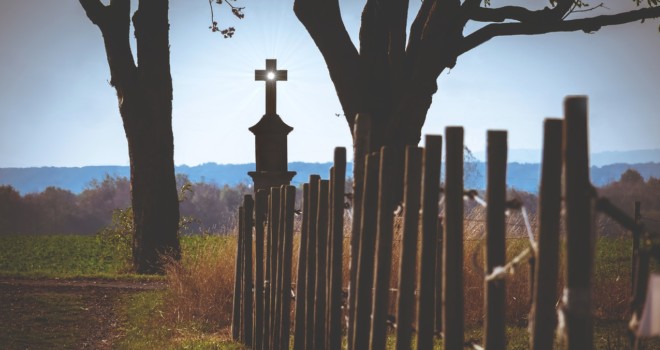As someone who has been a confessing Christian for several years, first in evangelical-charismatic churches and then in the Catholic Church since 2004, I’m delighted to report that most of the friends that I’ve made over the years have kept the faith and are serving Christ in some capacity. At the same time, I’ve seen a smaller minority who have shipwrecked their faith (I Tim. 1:19).
I can identify with Christ’s words to St. Faustina in the
First Day of the Divine Chaplet about “the bitter grief into which the loss of
souls plunges me.” Ships go down for different reasons: some founder on rocky
shoals; others, like the Edmund Fitzgerald, have their main hatchway cave in
during a major storm with gale force winds; still others, during war, sink
because they’re torpedoed and/or bombed heavily from aircraft above.
This essay will, for the most part, explore some of the more
overlooked reasons for a person’s fall from grace. As the apostle Paul said, if
we are ignorant of Satan’s schemes, he can easily gain the advantage over us
(II Cor. 2:11).
Names, places, and other details have been changed in this
article to protect the identities of the people involved. They provide a
cautionary tale: we can learn how to remain in a state of grace by learning
from those who fell away.
The Perils Of Becoming Offended
Sometimes people enter the kingdom of God with unrealistic
expectations. Instead of seeing this Vale of Tears as a soul-making world where
God is getting us ready for heaven by conforming us to the image of his Son through
diverse and many trials and tribulations, they see God as a Means to an End,
and that End is a world where all their dreams come true.
White picket fences, balmy breezes, and storybook endings. Many
people, instead, see their affliction increase after their conversion,
or, as one man said, “When I was baptized and entered the Catholic Church, I
was not only baptized into the death and resurrection of Christ; I was
baptized into trouble.”
In the missionary journeys of Paul and Barnabas to different
cities, they sought to strengthen the souls of the disciples by “exhorting them
to continue in the faith, and saying that through many tribulations we
must enter the kingdom of God” (Acts 14:22) When people enter the kingdom of
God with false expectations and encounter a soul-making world, they often
become offended and sometimes return to their former way of life.
This is what happened to the children of Israel in their
wilderness wanderings. When they encountered different trials, they wanted to
return to the pleasures and conveniences of Egypt, a type of the world we leave
in our conversion.
When Jesus shocked his audience by telling them that unless
they “eat of his flesh and drink of his blood, they have no part in him,” many
disciples became offended and deserted him (Jn. 6:66). In the parable of the
sower, he talks about the seed sown on rocky ground that initially receives the
word with joy, but, because “he has no root in himself… endures for a while,
and when tribulation or persecution arises on account of the word, immediately
he falls away” (Mt. 13:20, 21).
This should be a sobering parable for “cultural Catholics,”
who only attend Mass weekly because they are of Irish descent from Albany, New
York, and that’s what their family has done for generations. This parable
should also cause “cafeteria Catholics” to examine the depth of their roots and
query if they’re more American than Catholic, if they’ve been more formed by the
surrounding culture than the teachings of the Church.
In a marriage, when one of the spouses is remaining faithful
to their faith and the other has fallen away and gone back into the world, it
wreaks havoc in the union. The apostle Paul talks about this being “mismated”
or “unequally yoked” (II Cor. 6:14).
The Story Of Karen And Dave
“Karen” came into the kingdom of God with unrealistic
expectations and was not ready for the soul-making world that awaited her. Her
husband, “Dave,” a devout Catholic, had graduated at the top of his class in
his MBA program at a respected university.
After graduation he got a job at a major company in the
Pacific Northwest and began to quickly rise in the ranks. But, with the
recession of 2008, his ascent stalled amidst cutbacks and changes in the
business climate.
The culture in the company became toxic so he left and
decided to launch his own business. After five years the couple, now with three
kids, finds themselves living check to check and taking on more debt with each
passing year.
This is not the script that Karen wrote for their lives. She
becomes simultaneously offended both at her husband and God for not making her
dreams come true.
She decides to take a break from weekly Mass attendance and
stops praying the Rosary in the morning. She tells herself and Dave that she
needs a break from formal religion and wants to find God in everyday life.
Unfortunately, the god she finds ends up looking a lot
like her.
She starts to go out drinking more and more with a couple of
her girlfriends who are also going through a mid-life crisis. Many factors are
working to erode the intimacy she once experienced with Dave.
Even as her offense with him begins to diminish, she finds
that the more and more she is out in the world, the more distant she feels
towards him. She can’t seem to love both the world and Dave at the same time.
She eventually has an affair with someone she meets on the
dance floor who “makes her feel alive.” She used to be submitted to the
Magisterium on such matters but is now more influenced by the dopamine and
oxytocin that course through her brain whenever she’s with “Mitch.”
She will go back and forth over the next couple of years but
eventually she will make the transition from following Church teaching to “following
her heart,” being guided by “her truth,” and listening to the god within as the
book Eat, Pray, Love encourages. Ross
Douthat argues that “the god within” isn’t a divine voice at all, but an
amplified human voice that caters to our self-love.
Karen has also, over the years, bought
into an erroneous concept from American culture of what it means to have a soul
mate. At first it was a healthy desire to have the same religion, values, and a
few other things in common, but it crossed a line where she began to demand
more and more that Dave become like her, that she would look across the table
and see…Karen!
This dynamic was rooted in the fact that Karen came from a
family with an emotionally distant father and a passive-aggressive mother.
Intimacy felt like it was rationed with an eye-dropper so hence the overreach
in her relationship to Dave.
Here, we can learn a lot from Mother Angelica, who, although
she suffered great material and emotional privation in her childhood,
eventually was able, by God’s grace, to get her emotional needs met through her
relationship to the Father, Son, and Holy Spirit, the Mother of God, intimate
friends, and in sacrificial service to the Church. Rather than trying to
control and manipulate the people around her to accomplish some selfish agenda,
she was able, as de
Caussade exhorts, to abandon her concerns to Divine Providence
According to the National
Center for Health Statistics, about 80 percent of the divorces are initiated
by women. I’m convinced that a false concept promulgated by our culture of what
it means to have a soul mate, has contributed to this trend.
If it feels like I’m picking on women in this essay, please
know that I’ve known many men who have fallen from grace. For example, in
general, men are more likely than women to cheat: 20% of men and 13% of women
reported that they’ve had sex with someone other than their spouse while
married, according to data from the recent General
Social Survey(GSS).
The practicing Catholic is filled with the fullness of grace
through their faith, and then, in a healthy balanced way, secondarily
through their family, friends, and work. Out of this fullness, they turn to serve
their spouse rather than turning in emptiness to have their spouse fill
them.
God is our Primary Source while people are secondary
resources. When we reverse the two, we find out that people make lousy gods.
May we all become acutely aware how desperately we need the supernatural, sanctifying grace of God each day in order to remain in a state of grace. Without it, we become just another story of a shipwrecked faith, another cautionary tale of a ship that set sail with hope and promise but did not return safely to the harbor.
✠












